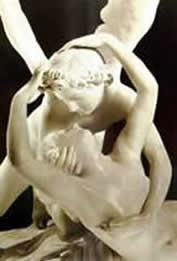Favola Concertante (1975, rev. 1977)
Ballet/Double Concerto
Duration: 20 minutes
Violin, Cello; str
Versions for piano trio and cello solo
(Favola I, a five-minute selection of excerpts) also available.
Commissioned by Orion Chamber Orchestra
Premiere: June 4, 1975; Orion Chamber Orchestra; Edward Nord, Conductor
Cupid and Psyche,
Antonio Canova
 Composer’s Note:
Composer’s Note:
Favola Concertante is both a ballet (depicting the ancient Greek version of Beauty and the Beast, the story of Psyche and Eros) and a concerto for violin, violoncello and string orchestra (in which the violin portrays the role of Psyche and the violoncello the role of Eros) – hence the title Favola Concertante, literally “concerted fable.” The five sections follow the story closely, depicting the action, not only through instrumental associations, but also through an operatic set of leitmotifs, the most prominent two of which are concerned with, respectively, Psyche’s beauty and Eros’ warning.
Synopsis:
I. A king and queen have three daughters, the youngest of whom is the most beautiful.
II. Psyche, as the youngest is called, is so beautiful that everyone pays her homage that has before been paid to the goddess Venus alone. Her sisters quickly marry, each to the son of a king. They mock Psyche, who remains alone, an object of beauty to which no one dares aspire.
III. For daring to possess beauty which rivals the divine, Psyche is condemned by the oracle of Apollo to be left on a hilltop to be wed to a monster. To punish her for daring to receive honors which are due only to the goddess of beauty, Venus calls upon her son, Eros, to cast a spell upon Psyche: to fall desperately in love with the vilest of earthly creatures. Psyche is saved from her fate by Eros, who, upon seeing her great beauty, cannot bring himself to carry out the sentence. Instead, he carries her off to a magnificent palace and makes her his wife. Each night he visits her, but leaves always just before daybreak with the warning that she must never look upon his face.
IV. Psyche invites her sisters to come and see that she is not only alive but in love and living in great splendor. When they see Psyche again, the sisters grow even more jealous than before and, by way of revenge, begin to torment her with doubts about her mysterious and invisible husband. When the sisters leave, Eros warns Psyche that her sisters are thinking not of her well-being but of the destruction of her happiness.
V. Still Psyche’s doubts grow. She is pregnant now, and she begins to fear that the father of her child is really the monster she was doomed to marry. Finally she gives in to her suspicions and, following her sisters’ advice, takes a lamp and knife into the bedchamber to find “the monster” and kill him; but, as she takes the forbidden look, she is amazed to find, instead of a monster, the god of love peacefully sleeping. For a moment she watches him, then she bends to kiss him; but, as she does, a drop of hot oil from her lamp falls on his shoulder and awakens him. Saddened by her doubt, he reproaches her and takes his leave.